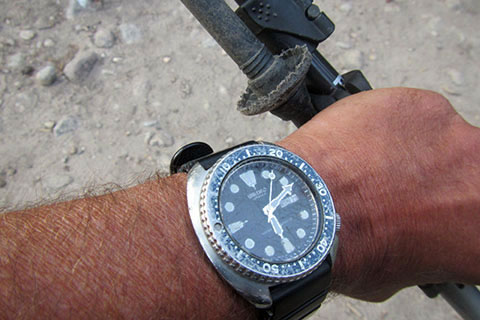| 746 | Self Rescue |
2012-12-21 |

As we plan a trip, we check a map find the mileage and plan our estimated travel time to the destination. We then decide when to start, when we should arrive at the destination, and when we should return to the trailhead. These travel times are predictions, so we allow a cushion for a slower than expected pace. We then leave these expected times with a responsible person. At the end of the trip we check in with our contact and tell them trip stories.
We have a great friend of many years, who is probably the most time challenged individual we have ever met. The stories of his lateness are legendary, but one monumental incident took place in Rocky Mountain National Park a few years back ...
My friend and three others left early to climb Notchtop Mountain. We have climbed the peak numerous times together and we knew he was very familiar with the approach, route, and descent. He was the only lead climber of the group, but all of the climbers would have thought the technical moves of the route to be easy. It was a great day in the Park with good weather.
Back at camp - in the afternoon, we met up with others of our group who did not go on the climb. One, was the father of one of the climbers. As we passed the time waiting we noticed that the group should have already returned, if they had moved at a normal pace, but my friend was leading the group! As the hours passed, the father grew more and more nervous. When the group was well overdue and darkness was approaching, we (my wife and I) excused ourself from the group and claimed we were going to some undeclared location. We left as soon as possible to find out what was going wrong.
We didn't talk in the car, we just drove. It was easy to spot their vehicle in the nearly empty parking area. We parked next to them, shouldered our packs, and sprinted up the trail. Darkness was coming quickly and we had 4 miles to the base of the peak. There was nothing positive about our silent thoughts. Someone in the group had to be seriously sick or injured for them to be this late. Our only thoughts were about the resources we had available to help them.
As we neared the final lake, one of the climbers appeared on the trail. It was the son of the waiting father. Anxiously, we waited to hear the details ... there was nothing wrong, other than they just were just much slower than expected. They were slow walking. They were slow taking breaks. They were slow climbing. They were slow belaying. They were slow moving. We waited until the whole group arrived and then we heard the stories again of why they were so late. When we returned to camp, we heard the stories again. I must admit they were getting pretty good by the third telling!
We were happy they were just slow, but it was still at the cost of many hours of anxious anticipation. So for a few Watch Your Time tips ...
Wear a watch! Yes, you might have the time on your phone or gps, but a watch is very convenient. A flip of the wrist and there is the time.
Know the mileage, elevation gain, and the condition of the route you are traveling.
Respect the weather patterns. If it gets extremely hot at midday, avoid moving at that time. If another thunderstorms hit the mountains between noon and two, avoid summits during the peak activity pattern. Our friends were lucky they did not get caught in a storm.
Start early. I recently read a blog of some novice hikers on a 14er claiming proudly they were glad they started so early in the morning - 8am. Hmm
Know your location at all times. If you refer to your map regularly, you will be able to track your movement by simply identifying features.
Always check the map at every trail sign and junction.
Keep a tally of your speed over the course and mileage to the destination. Re-figure the ETA frequently.
The more miles you walk, the better you will be at predicting your speed and ETA.
It is also very helpful to know the times of sunset and sunrise. Many hikers do not feel comfortable hiking in the dark. Anxiety increases as darkness arrives.
On an out and back trip - if you sense that you are going to be late, you might consider shortening your trip.
Accidents frequently happen when we are tired. It is easy to make bad decisions.
Groups take significantly longer time to do anything.
Shortcuts are seldom shorter.
Always "check in" at the end of the trip.
Watch Your Time - most rescues happen because of compounded mistakes. We got a late start, then we were not moving as fast as expected, so we got caught in a thunderstorm, etc. Know your location, time, and speed and make calculated decisions.
Happy Watch Your Time trails
Down is Optional ... Up is Mandatory - introduction
Self Rescue on Trails - the program
Self Rescue - Plan Ahead - plan to prevent
Self Rescue - Be Kind to Yourself - don't make it hard, make it easy
Self Rescue - Be a Lightweight - walk light and easy
Self Rescue - Avoid Huffing and Puffing - listen to your body and control your speed
Self Rescue - Take a Break - give your body a chance to recover
Self Rescue - No Food, No Fuel, No Fun - feed the motor
Self Rescue - Watch Your Time - always know your location, time, and speed